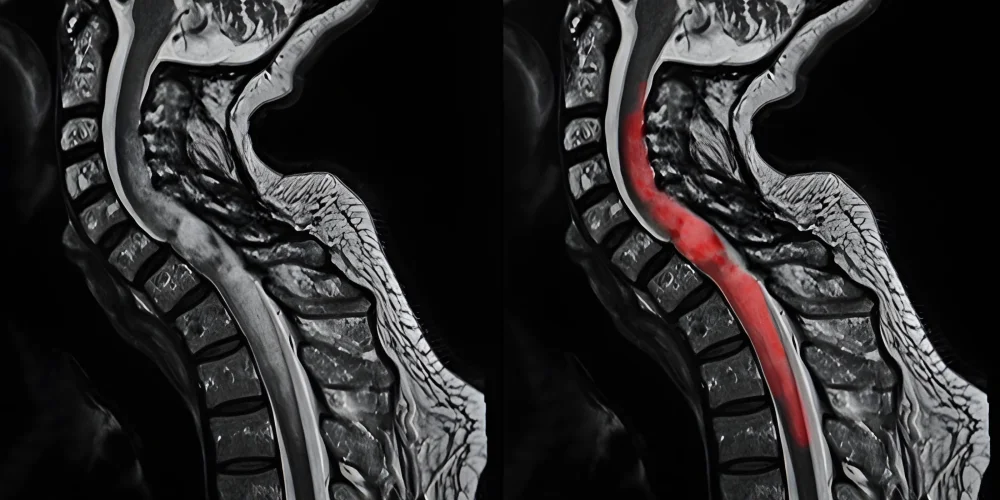Spinal Cord Tumor Removal Surgery
Precision, Experience, and Compassionate Care for Spinal Health
Spinal cord tumor removal can be an insurmountable medical challenge. At Chirayu Super Speciality Hospital, our surgery to remove spinal cord tumors provides patients with top quality medical attention using cutting edge surgical methods and techniques backed by neurosurgeons who focus on security, precision, and well-being for each individual patient. With dedicated care that helps improve and restore lives – Chirayu is committed to offering tailored services designed to improve life quality through customized treatment plans that enhance recovery while improving life experiences.

What Is A Spinal Cord Tumor?
A spinal cord tumor is defined as any abnormal growth of cells within and around the spine that appears either benign (non-cancerous) or malignant (cancerous). They may affect any portion of the spinal cord including nerve roots or vertebrae and cause neurological symptoms or pain – leaving untreated, permanent injury could ensue.
Who Performs Your Surgery?
At our procedures to spinal cord tumor removal, our surgery is performed by a team of highly experienced and skilled neurosurgeons specializing in neuro-oncology and spine surgery. Utilizing cutting-edge technology and innovative surgical techniques, they strive to deliver optimal results to their clients while upholding patient safety. With decades of collective experience combined with their commitment to patient care, you are in safe hands when receiving our care.
Types of Spinal Cord Tumors
- Intramedullary Tumors : These tumors originate within the spinal cord itself, such as astrocytomas and ependymomas. They can disrupt normal spinal cord functions.
- Extramedullary Tumors : Tumors that grow in the tissues surrounding the spinal cord, like meningiomas and schwannomas. These can compress the spinal cord or nerve roots.
- Primary Spinal Tumors : These originate in the spine or spinal cord and can be benign or malignant.
- Metastatic Spinal Tumors : These are secondary tumors that spread to the spine from cancer elsewhere in the body.
Symptoms of Spinal Cord Tumors
Symptoms of spinal cord tumors vary based on their size, type, and location. Common symptoms include back pain, which may spread to other parts of the body, numbness or tingling in the arms or legs, weakness or loss of coordination, difficulty walking, and changes in bladder or bowel function. If you experience any of these symptoms, it’s important to seek medical advice promptly.
Diagnosis of Spinal Cord Tumor Surgery
Diagnosing a spinal cord tumor typically involves a thorough neurological examination to evaluate symptoms. Imaging tests, such as MRI and CT scans, provide detailed views of the spine to locate and assess the tumor. In some cases, a biopsy may be performed to analyze tumor tissue and confirm the diagnosis. Blood tests may also be conducted to check for specific markers or underlying health conditions.
Treatment of Spinal Cord Tumor Surgery
The primary treatment for spinal cord tumors is surgical removal. This procedure aims to excise as much of the tumor as possible while preserving spinal cord function. Additional treatments may include radiation therapy to target any remaining tumor cells, chemotherapy for malignant tumors, and targeted therapy based on the tumor’s specific characteristics. Our multidisciplinary approach ensures that each patient receives the most effective and comprehensive care.
Care and Recovery After Surgery
Post-surgery care is crucial for a successful recovery. Patients are closely monitored in the ICU or recovery room immediately after surgery. Rehabilitation, including physical therapy and occupational therapy, plays a key role in regaining strength, mobility, and function. Follow-up appointments are essential to monitor healing and detect any recurrence of the tumor. Psychological support is also provided to help patients and their families cope with the emotional aspects of recovery.
Advantages of Choosing Our Surgery Services
Expert Neurosurgical Team
Specialized surgeons with extensive experience in complex spinal cord tumor surgeries ensure high success rates.
Advanced Imaging and Navigation
Cutting-edge imaging technologies guide precise tumor localization and removal, enhancing safety.
Personalized Rehabilitation
Post-surgery rehabilitation programs are tailored to restore mobility and quality of life.
What Our Patients Say
Read about our patients positive experiences and how Chirayu Super Speciality Hospital has positively impacted their health and well-being.


The staff’s attention to detail and patient care made a huge difference in my recovery after spinal surgery.


Thanks to Chirayu skilled surgeons, my back pain is gone, and I’m back to living a full life.


From diagnosis to recovery, the team was professional and compassionate. My spinal surgery experience was excellent.


The expertise and care I received during my spinal cord tumor surgery were exceptional. Highly recommend Chirayu Hospital!
Meet Our Medical Specialists
Our team of expert neurosurgeons specializes in spinal cord tumor removal, ensuring precise, compassionate, and comprehensive care for our patients.
Frequently Asked Questions
Here, we provide answers to some of the most commonly asked questions to help you better understand about our surgery services. If you have any additional questions, please do not hesitate to contact us.
Recovery time varies but typically involves several weeks. Full recovery can take months, depending on the complexity of the surgery.
This surgery involves removing abnormal growths in or around the spinal cord to relieve symptoms and prevent complications.
Risks include infection, bleeding, nerve damage, and anesthesia complications. Your surgeon will discuss all potential risks with you.
Depending on the tumor type and extent of removal, additional treatments like radiation therapy or chemotherapy may be necessary.
Diagnosis usually includes MRI or CT scans and may involve a biopsy to determine the nature and type of the tumor.



